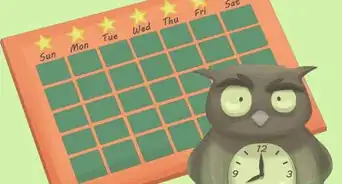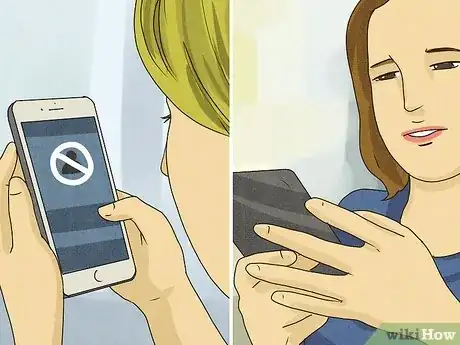This article was co-authored by Jay Reid, LPCC and by wikiHow staff writer, Eric McClure. Jay Reid is a Licensed Professional Clinical Counselor (LPCC) in private practice in San Francisco, CA. He specializes in helping clients who have survived a narcissistic parent or partner. Treatment focuses upon helping clients identify and challenge self-diminishing beliefs as a result of narcissistic abuse. Jay holds a BA in Psychology from the University of Pennsylvania and an MS in Clinical Psychology from Penn State University.
There are 7 references cited in this article, which can be found at the bottom of the page.
This article has been viewed 64,502 times.
What can you expect from a narcissist when you block them or go no contact? Blocking a narcissist may be a great move if you want to improve your mental health and overall happiness, although their reaction may be a bit unpredictable. If you want help navigating what comes next, we’ve got your back. In this article, we’ll walk you through everything you need to know about how a narcissist will respond to being blocked.
Steps
They’ll probably treat it as a personal attack.
-
Most narcissists will view being blocked as an act of aggression. A blocked narcissist won’t have any ability to silence or control you, which is very important for them. This is highly likely to be an overwhelming and scary feeling for them. As a result, a narcissist is very likely to view your behavior as a deeply serious transgression and a call to arms.
- Go all the way with full no contact if you’re going to block a narcissist.
- If you only block them on social media or on your phone, they’re likely to act up on whatever platform they can access.
They’re likely to throw a temper tantrum.
-
Most narcissists will struggle to keep their cool in response to this. They may hurl insults at you, or show up at your house to confront you in person. If they’re really incapable of controlling themselves, they may even threaten you. This is why it’s generally not a good idea to let a narcissist know you’re going to block them ahead of time. Avoid the confrontation by just blocking their number and social media accounts and move on.[1] X Research source
- Don’t respond to any insults or threats. Remember that it’s not your fault that this is happening—you’re doing nothing wrong by cutting them out of your life.
- If you ever feel like you’re in danger, do not hesitate to contact the police.
They might be confused and just move on.
-
If they have a grandiose personality, there’s a chance they’ll dismiss you entirely. For the “I’m better than everyone else” narcissist, being blocked may be extremely confusing. They may think you’re crazy for not wanting them in your life or be lost on what happened to make you cut ties. For these folks, they’re likely to detach from you, pretend they never knew you in the first place, and move on.[2] X Trustworthy Source PubMed Central Journal archive from the U.S. National Institutes of Health Go to source
- This is probably a best-case scenario. If you’re dealing with a narcissist who thinks they’re the greatest person of all time, blocking them may be the way to go.
They’ll downplay your relationship to others.
-
If you don’t give in, they’ll deny you ever mattered to them. This is a narcissist’s way of avoiding their true feelings about what happened. They may tell people they were only your friend because they felt sorry for you, or refuse to admit that you two were ever close in the first place. This dismissiveness makes them feel better about themselves.
- At this point, you can take solace knowing they’re probably giving up.
- They know they have no power over you, so they’re doing the only thing they can—denying.
They could change temporarily to get you back.
-
For a narcissist with poor self-esteem, they may do anything to keep you around. However, any change you see in their behavior is very likely to be fleeting. A narcissist who needs you to worship or adore them will scurry to do whatever they can to keep you around, but that doesn’t mean they’re going to change who they are. You may see a temporary improvement, but don’t bet on them changing for real.
- For example, if you’ve got a narcissistic friend who yearns for your attention by always playing the victim, they may stop for a week or two.
- Unfortunately, whatever change they make is highly likely to be short-lived. They’re very likely to start complaining soon enough.
They may accuse you of abusive behavior.
-
Narcissists often deflect by trying to turn things around on others. If you’re blocking them after you’ve tried addressing their behavior, they may accuse you of doing the very same thing you’re blocking them for in the first place. Narcissists project their issues on to others when they don’t get what they want, so expect them to start complaining about your behavior once you block them.[3] X Research source
- For example, if you’ve talked to a narcissist about not criticizing your life choices and you block them, they may start telling people you’ve got a problem criticizing others.
They’re likely to spread rumors or gossip.
-
Do not expect a narcissist to stay quiet about what went down. You’re very likely to start hearing some lies about yourself. When a narcissist doesn’t get what they want, they’ll look elsewhere for validation. This will usually involve playing the victim card with others by spreading misinformation about how poorly you treated them.[4] X Research source
- They may do this in an effort to draw you out into contacting them. Don’t give them what they want.
- For example, if you cut off a narcissist because they refused to stop lying to you, they may hop on Facebook or Snapchat and go on rants about you’re a compulsive liar.
They may try to build a coalition out of mutual friends.
-
An especially vindictive narcissist will try to turn others against you. They’re not going to be happy about you blocking them, and they may try to convince your friends and family that you’re toxic (or even narcissistic yourself). This may hurt, but if your mutual friends or family members are understanding, a simple explanation may put an end to this.[5] X Research source
- If you prefer, you can just let friends and family know that you’re putting a moratorium on any questions about what happened with the narcissist.
- If you don’t want to get a ton of questions about what happened, you may want to consider cutting off mutual contacts whom you aren’t close with.
They may try to get revenge.
-
With an especially vindictive narcissist, they may try to get back at you. If you work together, they might file a claim with HR to try and get you fired. If you go to the same school, they may try getting you in trouble with your favorite teacher. As hurtful as this behavior may be, try to remember that this says more about them than you. If their claims are unfounded, don’t worry. Nothing should come of this.[6] X Trustworthy Source Greater Good Magazine Journal published by UC Berkeley's Greater Good Science Center, which uses scientific research to promote happier living Go to source
- The trick here is to refuse to engage. Let them make themselves look petty and silly by making false accusations and refusing to let it go.
They may try negotiating with you.
-
If they don’t have an angry reaction, they may get desperate. Cutting a narcissist off may cause them to start pleading and begging. They might promise to change, or offer to get you a gift or something like that in exchange for not cutting them off. Don’t buy it. Stick to your guns and refuse to let it go—any promises they make now are just going to be empty.[7] X Research source
- This is often a last-ditch effort to keep you around, but they’re unlikely to keep their word here.
- If their initial reaction to being blocked is fury and now they’ve suddenly changed their tune, it’s an especially big sign they don’t mean it.
They’re very unlikely to apologize or change.
-
Blocking a narcissist is not the move if you want them to improve. If your goal here is to get the narcissist to realize what they’ve been doing wrong and change, blocking them is unlikely to work. Instead, your best bet is to set healthy boundaries, address their behavior empathetically, and try to get them some support.[8] X Trustworthy Source HelpGuide Nonprofit organization dedicated to providing free, evidence-based mental health and wellness resources. Go to source
- This isn’t to say that you should 100% never block a narcissist—that may indeed be the best option for your mental health and overall happiness.
You Might Also Like
 Mental Hospitals: A Complete Guide to Involuntary & Voluntary Commitment
Mental Hospitals: A Complete Guide to Involuntary & Voluntary Commitment




 Stop Stammering: Easy-to-Follow Tips and Tricks to Smooth Your Speech
Stop Stammering: Easy-to-Follow Tips and Tricks to Smooth Your Speech
-Step-17-Version-2.webp)







References
- ↑ https://psychcentral.com/health/breaking-up-with-a-narcissistic-personality#letting-go
- ↑ https://www.ncbi.nlm.nih.gov/pmc/articles/PMC8319504/
- ↑ https://psychcentral.com/blog/psychology-self/2017/09/narcissistic-projection#1
- ↑ https://www.psychologytoday.com/us/blog/here-there-and-everywhere/201606/how-leave-narcissist-good
- ↑ https://www.psychologytoday.com/us/blog/here-there-and-everywhere/201606/how-leave-narcissist-good
- ↑ https://greatergood.berkeley.edu/article/item/how_to_help_a_narcissist_to_forgive
- ↑ https://psychcentral.com/health/breaking-up-with-a-narcissistic-personality#what-to-expect
- ↑ https://www.helpguide.org/articles/mental-disorders/narcissistic-personality-disorder.htm

























































Medical Disclaimer
The content of this article is not intended to be a substitute for professional medical advice, examination, diagnosis, or treatment. You should always contact your doctor or other qualified healthcare professional before starting, changing, or stopping any kind of health treatment.
Read More...